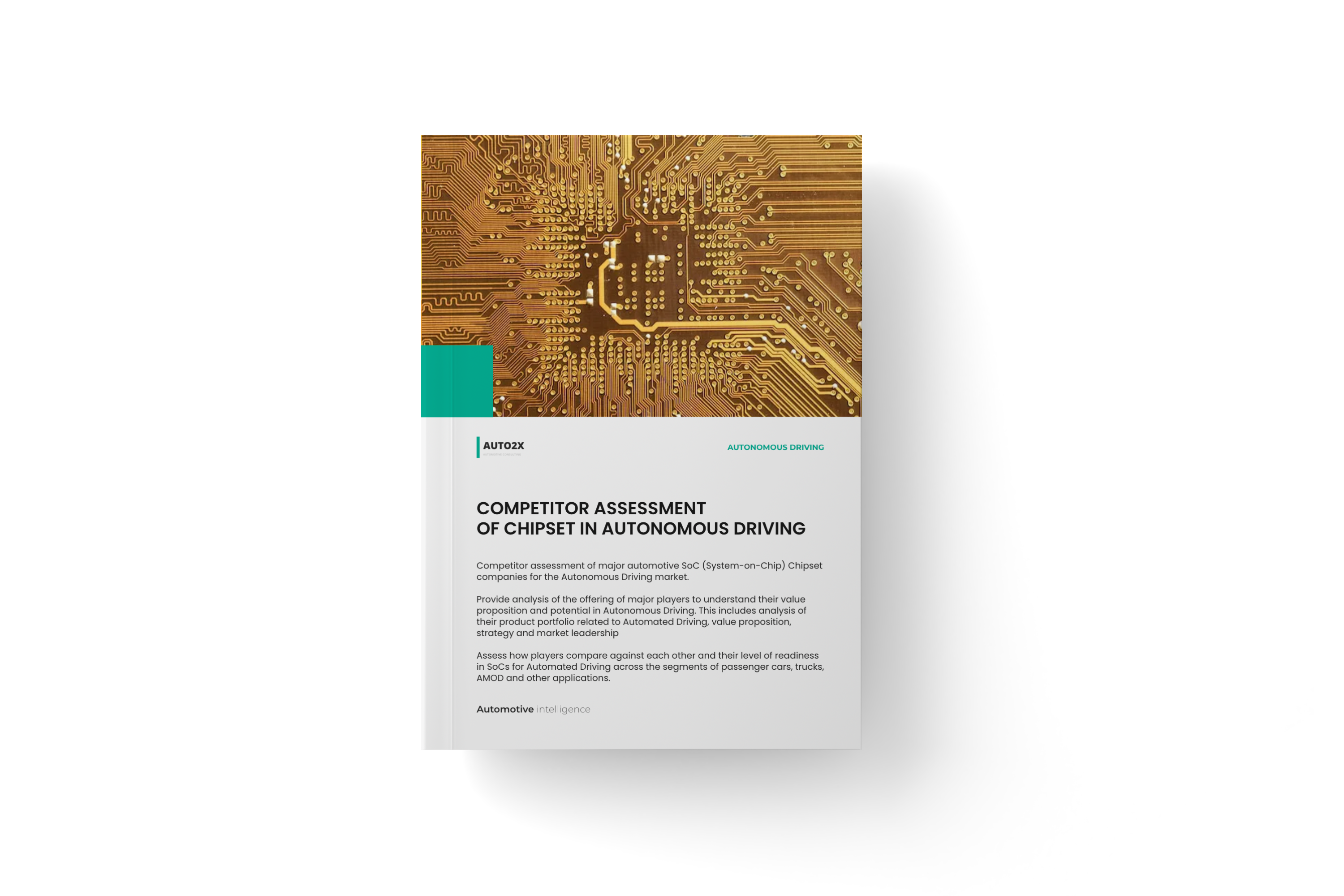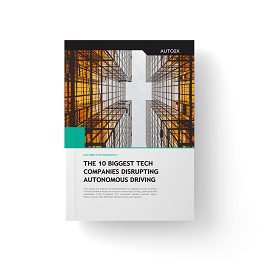Description
What this report delivers
This report provides a Competitor Assessment of major automotive SoC (System-on-Chip) Chipset companies for the Autonomous Driving market.
- Understand the offering of major players to understand their value proposition and potential in Autonomous Driving. This includes analysis of their product portfolio related to Automated Driving, value proposition, strategy and market leadership
- Assess how players compare against each other and their level of readiness in SoCs for Automated Driving across the segments of passenger cars, trucks, AMOD and other applications.
Competition in Automotive SoC is getting stronger as Carmakers seek secure chipset supply chain
- BMW signed an agreement with Inova Semiconductors and GlobalFoundries Inc., guaranteeing the supply of “several million” chips per year.
- Ford has forged a strategic collaboration with GlobalFoundries to explore buying directly from the U.S.-based chipmaker.
- General Motors to jointly create chips with producers including Infineon and Taiwan Semiconductor Manufacturing Co.
- Stellantis NV has inked a deal with Foxconn Technology Group to develop automotive chips together.
- SAIC’s investment arm went a step further, investing 500 million yuan in auto chip startup GTA Semiconductor Co.
- Tesla is working together with Samsung Electronics to develop chips for their next-gen HW 4.0;
New players enter Automotive Chipsets to monetize rising demand
Chinese tech giants are developing their own semiconductors and tapping domestic capital markets to reduce dependence on foreign suppliers
Chinese automotive semiconductor companies continue to expand their businesses, although their technology lags market leaders, such as NXP Semiconductors, Renesas, Nvidia and Infineon. Especially in semiconductor segments that involve back end manufacturing and fabless design, the market share of Chinese companies has risen substantially in the previous years, mainly via companies like HiSilicon, the semiconductor subsidiary of Huawei.
Chinese semiconductor and chipset developers can strengthen their competitiveness in these specific segments as these processes are, in general, less technically challenging, more labour-intensive, and highly compatible with end-customer applications, of which Chinese OEMs develop many.
Baidu’s AI chip unit Kunlun, completed a round of fundraising in March 2021, valuing its business at approximately $2 billion. The financial round was led by CITIC Private Equity Funds Management, IDG Capital, and Legend Capital. Kunlun’s integrated circuits are currently used by Baidu’s smart electric vehicles under Jidu Auto, and cloud computing. Also, Kunlun was formed as an independent company.
In Jan’21, Baidu unveiled a robocar concept capable of Level 5 and second-generation AI chip. The Chinese tech giant shared its vision for mobility of the future in the form of a robocar, capable of Level 5 autonomous driving capabilities. Baidu has started to mass produce the Kunlun II, the second-generation version of its AI chip. The chip will use 7nm process technology, with computational capability that will be around two to x3 better than the original Kunlun chip.
Huawei’s Kirin 990 in-vehicle chip that can reach 800 TOPs computing power and supports 5G network. The chipset has an octa core CPU comprising four large cores dubbed Taishan V20 Lite, an octa-core ARM G-76 GPU and a tri-core AI dedicated unit. Huawei’s Balong 5000 5G chipset powers GAC’s electric cars with 5G and V2X communication modules.
Tesla & Samsung to develop 5nm semiconductor chipset for autonomous cars
Samsung has recently accelerated its efforts on autonomous driving technology. In Jan’21, Tesla announced a partnership with Samsung Electronics to develop a 5-nanometre semiconductor for fully autonomous vehicles. Application areas include in the Tesla infotainment (IVI) product family, which utilizes semiconductors such as processors, neural network processing units (NPUs), security integrated circuits, memories, and display driving chips (DDI).
The Samsung Electronics Foundry Division is currently conducting research and development on 5nm-class system semiconductors to be mounted on Tesla autonomous vehicles. The 5nm semiconductor applied with the extreme ultraviolet (EUV) process is a high-tech product that only a small number of companies such as Samsung Electronics and TSMC can produce worldwide.
Tesla has also been receiving artificial intelligence chips from NVIDIA to develop self-driving cars, but in an attempt to make its own chips, it has tied-up with Samsung. Recently, Tesla announced it is working on HW 4.0 self-driving chip with TSMC for mass production in Q4 2021.
Table of Contents
-
Executive Summary
1.1. Key takeaways from the assessment of major Automotive SoC providers
1.2. Comparison of players’ competence in technology, strategy, market positioning
1.3. Assessment of the readiness level in SoCs for Automated Driving
1.4. Recommendations for new entrants
-
The emerging trends in Automotive SoCs for Automated Driving
2.1. Key opportunities in the Automotive SoC market for Autonomous Driving
2.2. Market Definition and segmentation (within Autonomous Driving)
2.3. Evolution of the player ecosystem
2.4. Market size 2020-21 and outlook by 2025: Addressable & serviceable market
-
Competitor Assessment
3.1. Alibaba
3.2. Ambarella
3.3. Broadcom
3.4. CARIAD: VW Group
3.5. Horizon Robotics
3.6. Qualcomm
3.7. NVIDIA
3.8. NXP
3.9. TI
3.10. Tencent
3.11. Xilinx
3.12. QT
To learn more about the Rankings and market shares of Automotive suppliers in ADAS read our relevant report. Key companies covered: APTIV, Bosch, Continental, Denso, Hella, Hitachi, Hyundai Mobis, Magna, Mobileye, Valeo, Veoneer, Zenuity, ZF, Baidu, Huawei, Microsoft, Qualcomm, Samsung, and Tencent.




